I’ve never been a fan of Paul Anka, but I was curious.
So I read his autobiography. My Way, and that affirmed an impression I’d long had of him.
Smart, astute, observant and a keen student, not only of pop music but the behaviour of people.
The book had been out for months and I figured one day I’d read it.
Then, I read a review by Bob Lefsetz in one of his almost daily Lefsetz Letters. This is a newsletter that became renowned for it’s coverage of music, often critical of the industry, that became a must-read of whom he was applauding or skewering. He’s since spread to politics, tech, TV, movies and other topics. Lefsetz can sound like a broken record at times but he continues to provoke.
So, not too long ago, he reviewed Anka’s book. What sold me is that Anka came to prominence in 1956. Of course! I should have remembered, and did, that he emerged in the second wave of rock and roll. I’ve never thought of him as a rock and roller, though, and that was a blind spot.
He avoided the payola scandal of the late 50s that ruined Alan Freed and somehow spared Dick Clark. He associated with Buddy Holly, is yet another person whose first encounter with Chuck Berry was sour.. Anka means well but knows he’ll forever be lumped in with the wave that leavened rock and roll and sold white bread to hungry teens .
I have had an endless fascination with the 50s and early 60s music business. I’ve read books on Chess Records, Bert Berns, Morris Levy (via Tommy James startling autobiography) Etta James, Motown and Rick Nelson, plus the inevitable Elvis Presley bios. It seems like a wild frontier without rules. It was much smaller, there were lots of connections being made and anyone could come off the street today and have a (minor) hit tomorrow. There were hustlers, aspiring producers, opportunistic would-be record label moguls, shady managers. It’s a fascination bordering on romantic even though the industry is unscrupulous. The acts tend to be ignorant and ready to be exploited.
Paul Anka wasn’t ignorant and couldn’t be exploited. There is a documentary film about him, Lonely Boy. Shot by the National Film Board and titled after his 1960 hit, Anka emerges as somebody in control, already by 1960 and still a teenager, a consummate professional. Likely he knows that his status as a teen idol isn’t going to last so he already is setting his sights on being an all-round entertainer bound for Las Vegas, which is ruled by Frank Sinatra’s Rat Pack.
While he is in awe of the Rat Pack – Sinatra, Sammy Davis Jr., Dean Martin, Peter Lawford, Joey Bishop – what sustains him is that he writes his own songs. This ensures that he won’t be a flavour of the month and no doubt helps him make his transition.
In Vegas, he witnesses the dirty dominance of the Mob, the changes wrought by the arrival of Howard Hughes, acknowledges its uncool image, its eventual legitimacy , and it’s renaissance. Reading My Way, it’s easy to conclude that although Las Vegas has become a popular tourist destination, it’s at the loss of the style the Mob brought to it. Here, too, he was smart enough to steer clear of any Mob dealing. Although he mingles with celebrities and billionaires, people of influence and power, Anka seems neither tainted n or jaundiced.
He sees the decline of Elvis, Sinatra and Davis, At these points, Anka seems to take a step back. He already knows what to do to survive but he seems more resolved.
My Way is full of similar accounts and asides. It can be wearisome when he recounts and gives thanks to many dear, close, trusted friends. He doesn’t talk much about the end of a long marriage, far less about a short and unhappy one, or his current relationship. That’s his privilege but it does leave a few gaps in what otherwise is a colourful and honest story.

